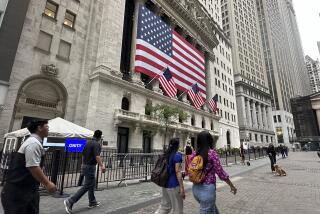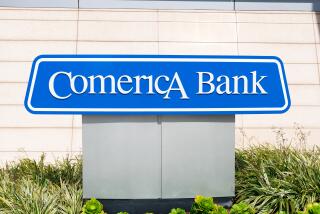Death Knell for the Megadeal? - With Securities Market Wary of Big Debt, More Takeovers May Go South
- Share via
The plunge in stock prices Friday is the most dramatic evidence yet of how turbulent and uncertain the securities market has become for highly leveraged buyouts and takeovers that leave acquired companies heavily in debt, experts said Friday.
Friday’s drop of 190 points in the Dow Jones industrial average was sparked in part by the news that a labor-management group had failed to get financing for a proposed $6.75-billion takeover of UAL Corp., parent company of United Airlines in Chicago. Buyout candidates like Hilton Hotels Corp., which has put itself up for sale, were particularly hard hit by the selloff.
The plunge is likely to put some pending deals on hold and lead to the renegotiation of others, experts told The Times. One possible result is that the price tag on some megadeals may come down and buyers will have to cough up more of their own money and rely less on high-cost borrowings.
“The (big, highly visible) deals are going to be more difficult to do,” said Bram Goldsmith, head of City National Bank in Beverly Hills. “You can see that with United Airlines. The deals are going to have to have more commitments. More equity and less debt.”
“If it’s a strategic deal that is not based on financials, then the deal will get done,” added one New York-based money manager. “But those deals that are highly leveraged with junk bonds or heavy bank financing, they are much less likely to be done in this environment.”
Marginal deals that have been in trouble for months may now fall through.
“I think some may use this as an excuse to back out of deals,” said Jon B. Kutler, who heads the Los Angeles office of Wasserstein, Perella & Co. “You may also see some try to strike better deals while the market is still nervous.”
The news about UAL came just two days after Ramada, the Phoenix-based hotel company, announced that it had shelved a $400-million offering of high-yield junk bonds by Aztar Corp., a new company formed to run Ramada’s casino operations. The offering was postponed apparently because there were not sufficient buyers for the bonds.
Ramada’s move further illustrated how skittish the nation’s junk bond market has become and how much more selective investors have gotten on high-yield debt offerings. Another $11 billion in junk bonds are scheduled for sale later this year, but investors are particularly concerned that industries such as retailing, airlines and casinos are burdened with far too much debt.
Some hailed the stock plunge as a sign that sanity is returning to the market for megadeals.
“This may bring some rationality back to the market,” said Los Angeles investment banker Brad Freeman. “If a company like United Airlines can’t get financing, then maybe the price is too high. It’s certainly not that it’s a bad company.”
“I fully agree,” said James Grant, editor of Grant’s Interest Rate Observer in New York. “We have been living in a time of inflated values and hot-air debt. I think there’s going to be less hot air forthcoming.”
One takeover target whose stock went up Friday was Aristech Chemical, a firm spun off from USX Corp. that just received a $25-a-share buyout offer from investors led by Jon M. Huntsman, chairman of Huntsman Chemical in Salt Lake City. The deal is valued at $817 million.
More to Read
Inside the business of entertainment
The Wide Shot brings you news, analysis and insights on everything from streaming wars to production — and what it all means for the future.
You may occasionally receive promotional content from the Los Angeles Times.










